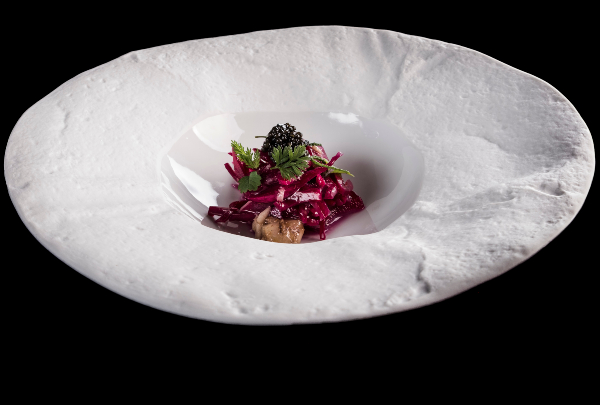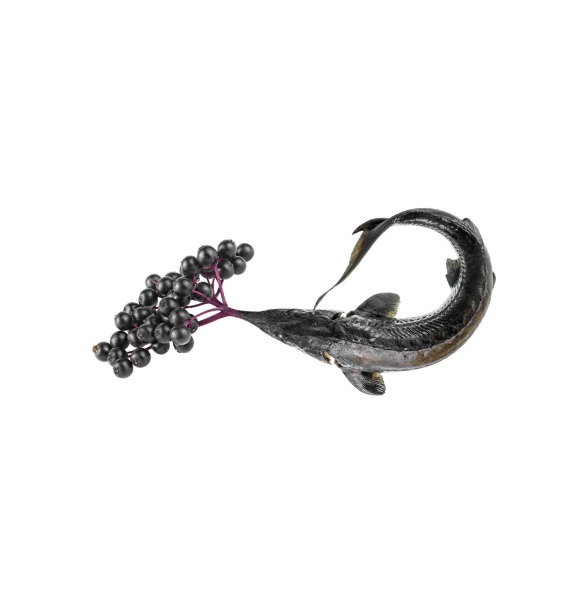Interview
Juan Luis Martínez, Peruvian-Venezuelan symbiosis via produce
.jpg)
Martínez is at the helm of Mérito, his personal project whose identity is shaped by the culinary language of two countries: Venezuela and Peru.
He first set eyes on Virgilio Martínez at Madrid Fusión 2013 giving a talk that marked a turning point on his professional path, which had until then looked towards Europe. This time it is he who will take the stage.
‘When I saw Virgilio Martínez at Madrid Fusión, I was surprised by the refinement and discussion about haute cuisine in Peru, much of which was based on a renewed appreciation for Andean produce,’ admits Juan Martínez from his restaurant Mérito, in Lima. This guy from Caracas already felt a certain fondness for Peruvian cuisine when he lived in the capital of Venezuela. ‘I’ve always liked Peruvian gastronomy. In Caracas I’d often go to certain restaurants, classics such as El Tizón, and I’d also go to a Sunday market in the Quebrada Honda neighbourhood that sold popular Peruvian produce and food,’ he says. But it was Virgilio’s talk in the auditorium at the congress that redefined his culinary future. A few days later, Juan was working at Central.
Two years later, in 2018, he had the chance to head his own project, Mérito, together with José Saume, who he’d met working in the kitchen of the restaurant Planta Baja, in Los Palos Grandes district in Caracas. ‘Mérito has a voice of its own. This is not fusion cooking because we’re not reinventing dishes; we’re just searching for flavours that entwine the two cultures. But at the same time, they have to be in harmony with the produce, its essence and where it’s from. We create a connection via the produce of both countries, not via their recipes,’ stresses Martínez.
Back then, it seemed that the fledgling business was in for a hard time as its launch coincided with that of many other young cooks who’d set their sights on Lima and were offering food similar to his. ‘It was groundbreaking cooking, well executed, using refined techniques, with a voice of its own; the produce available was made the most of, but it was hard to classify these restaurants, the most outstanding of which included: Statera (André Patsías), Kjolle (Pia León), 7 (Ricardo Martins), Mó Bistró (Matías Cilloniz) and Matria (Arlette Eulert),’ he says. However, it was well received from the start thanks to his experience at Central. In fact, Martínez admits that many of the recipes used at Mérito are inspired by Virgilio’s restaurant. His nationality also helped. ‘I come from Venezuela, whose migration crisis is very strongly felt in Peru, and I reckon that people were quite curious about that. Many diners thought that because we were Venezuelan, we’d cook traditional food from home.’ Another thing Juan believes was helpful was the way his open kitchen was accepted from day one. ‘The diners sitting at the counter were practically in the kitchen, they could feel the heat from the stoves,’ he says.
Juan thinks that the fact he’s from another country neither made it easier nor harder for him to get his project off the ground. ‘I migrated here before the current crisis, I had the support of my family and I wanted to cook in other places. That I’m from another country hasn’t made it easier or harder; it was as difficult as setting up a restaurant of this kind anywhere; you have to carve out your own place, earn respect, create a community of frequent diners. You must make what is conveyed on the plate understandable.’ Not in vain, he explains that many in the Venezuelan media, when they interview him, hold him up as an example of what is achievable. ‘But I always stress that we are just cooks, well trained and doing creative work, that everything we serve is the fruit of dedication,’ he insists.
Managing a restaurant has taught him that cooking is only one part of the business and that, in addition to the food offered, other equally important issues must be kept in mind. ‘As a chef, you’re faced with factors that go beyond cooking; you have to deal with designers, suppliers, social media, the local council – these are just some aspects that are part and parcel of running a restaurant. More than once I’ve asked myself ‘what kind of a mess have I got myself into?’ and to top it all off, the pandemic arrived. But when I see that everything is up and running as it should be, I forget all the difficult things. As with anything of value, the greatest rewards are in proportion to the sacrifice and effort made. Personally, I’ve always tried to travel on the less beaten road – the more unfamiliar one – because I don’t think everything has been said. It might not be the easiest way of doing things as it can lead to feelings of fear and insecurity. But, on the other hand, it’s comforting and it teaches you,’ he says frankly.
The pandemic has led them to reshape some of the items on Mérito’s menu. He rightly points out that ‘not everything can be delivered, nor have some dishes been devised to be transported in a box because they’ll become something else.’ He also highlights the fact that, as everyone is in the same boat, the conditions for competing ‘are now different.’ He adds, ‘the lesson is learning to find the positive side of difficult things, changing your mindset so you’re constantly reinventing yourself, challenging creativity, making dishes that aside from being delicious and attractive, are in perfect condition when they get to your home. I think of what the diner who receives it will feel; if they’ll feel satisfied for what they paid for, given that there are no other factors to influence as in a restaurant, such as the interior design, the ambience, the music, the service. It’s the diner and the food, face to face, alone at the table at home.’ A real challenge. ‘Financially speaking, it’s been helpful not to think so much about concept and image as they don’t always balance out when it came to costs. Now, I can’t think like that anymore because not everything is affected by cost, but I do think about how the food is packaged. I realised that diners were not necessarily looking for a “delivery” experience, but good food,’ he reasons.
A high point last year was being ranked 37 on The Latin America’s 50 Best Restaurants list, ensuring that locals who didn’t know him are now familiar with the restaurant.
For Juan Martínez, future projects include expanding Demo, ‘it’s the other side of Mérito and is an extension of the counter.’ Demo is a project that emerged during the pandemic, ‘before opening, we experimented by creating products for delivery. These include salads, flatbreads, desserts, breakfasts and brunches – all traditionally Venezuelan and Peruvian.’
We’ll soon see him on the stage at Madrid Fusión where he’ll explain in detail how Mérito was set up. He’ll also reveal the world of tubers ‘in a different and creative way, adding them to dishes in a much more refined way and bringing out all their potential.’ He’ll also talk about produce, such as arracacha, mashua, cassava, olluco, taro and sweet potato, among others. His goal is to make their use mainstream, reinvent them in recipes and include them in haute cuisine as a star ingredient, making the most of the fact they are available all year round, and are part of his fellow countrymen’s diet, not to mention nutritious and inexpensive.
‘When I saw Virgilio Martínez at Madrid Fusión, I was surprised by the refinement and discussion about haute cuisine in Peru, much of which was based on a renewed appreciation for Andean produce,’ admits Juan Martínez from his restaurant Mérito, in Lima. This guy from Caracas already felt a certain fondness for Peruvian cuisine when he lived in the capital of Venezuela. ‘I’ve always liked Peruvian gastronomy. In Caracas I’d often go to certain restaurants, classics such as El Tizón, and I’d also go to a Sunday market in the Quebrada Honda neighbourhood that sold popular Peruvian produce and food,’ he says. But it was Virgilio’s talk in the auditorium at the congress that redefined his culinary future. A few days later, Juan was working at Central.
Two years later, in 2018, he had the chance to head his own project, Mérito, together with José Saume, who he’d met working in the kitchen of the restaurant Planta Baja, in Los Palos Grandes district in Caracas. ‘Mérito has a voice of its own. This is not fusion cooking because we’re not reinventing dishes; we’re just searching for flavours that entwine the two cultures. But at the same time, they have to be in harmony with the produce, its essence and where it’s from. We create a connection via the produce of both countries, not via their recipes,’ stresses Martínez.
Back then, it seemed that the fledgling business was in for a hard time as its launch coincided with that of many other young cooks who’d set their sights on Lima and were offering food similar to his. ‘It was groundbreaking cooking, well executed, using refined techniques, with a voice of its own; the produce available was made the most of, but it was hard to classify these restaurants, the most outstanding of which included: Statera (André Patsías), Kjolle (Pia León), 7 (Ricardo Martins), Mó Bistró (Matías Cilloniz) and Matria (Arlette Eulert),’ he says. However, it was well received from the start thanks to his experience at Central. In fact, Martínez admits that many of the recipes used at Mérito are inspired by Virgilio’s restaurant. His nationality also helped. ‘I come from Venezuela, whose migration crisis is very strongly felt in Peru, and I reckon that people were quite curious about that. Many diners thought that because we were Venezuelan, we’d cook traditional food from home.’ Another thing Juan believes was helpful was the way his open kitchen was accepted from day one. ‘The diners sitting at the counter were practically in the kitchen, they could feel the heat from the stoves,’ he says.
Juan thinks that the fact he’s from another country neither made it easier nor harder for him to get his project off the ground. ‘I migrated here before the current crisis, I had the support of my family and I wanted to cook in other places. That I’m from another country hasn’t made it easier or harder; it was as difficult as setting up a restaurant of this kind anywhere; you have to carve out your own place, earn respect, create a community of frequent diners. You must make what is conveyed on the plate understandable.’ Not in vain, he explains that many in the Venezuelan media, when they interview him, hold him up as an example of what is achievable. ‘But I always stress that we are just cooks, well trained and doing creative work, that everything we serve is the fruit of dedication,’ he insists.
Managing a restaurant has taught him that cooking is only one part of the business and that, in addition to the food offered, other equally important issues must be kept in mind. ‘As a chef, you’re faced with factors that go beyond cooking; you have to deal with designers, suppliers, social media, the local council – these are just some aspects that are part and parcel of running a restaurant. More than once I’ve asked myself ‘what kind of a mess have I got myself into?’ and to top it all off, the pandemic arrived. But when I see that everything is up and running as it should be, I forget all the difficult things. As with anything of value, the greatest rewards are in proportion to the sacrifice and effort made. Personally, I’ve always tried to travel on the less beaten road – the more unfamiliar one – because I don’t think everything has been said. It might not be the easiest way of doing things as it can lead to feelings of fear and insecurity. But, on the other hand, it’s comforting and it teaches you,’ he says frankly.
The pandemic has led them to reshape some of the items on Mérito’s menu. He rightly points out that ‘not everything can be delivered, nor have some dishes been devised to be transported in a box because they’ll become something else.’ He also highlights the fact that, as everyone is in the same boat, the conditions for competing ‘are now different.’ He adds, ‘the lesson is learning to find the positive side of difficult things, changing your mindset so you’re constantly reinventing yourself, challenging creativity, making dishes that aside from being delicious and attractive, are in perfect condition when they get to your home. I think of what the diner who receives it will feel; if they’ll feel satisfied for what they paid for, given that there are no other factors to influence as in a restaurant, such as the interior design, the ambience, the music, the service. It’s the diner and the food, face to face, alone at the table at home.’ A real challenge. ‘Financially speaking, it’s been helpful not to think so much about concept and image as they don’t always balance out when it came to costs. Now, I can’t think like that anymore because not everything is affected by cost, but I do think about how the food is packaged. I realised that diners were not necessarily looking for a “delivery” experience, but good food,’ he reasons.
A high point last year was being ranked 37 on The Latin America’s 50 Best Restaurants list, ensuring that locals who didn’t know him are now familiar with the restaurant.
For Juan Martínez, future projects include expanding Demo, ‘it’s the other side of Mérito and is an extension of the counter.’ Demo is a project that emerged during the pandemic, ‘before opening, we experimented by creating products for delivery. These include salads, flatbreads, desserts, breakfasts and brunches – all traditionally Venezuelan and Peruvian.’
We’ll soon see him on the stage at Madrid Fusión where he’ll explain in detail how Mérito was set up. He’ll also reveal the world of tubers ‘in a different and creative way, adding them to dishes in a much more refined way and bringing out all their potential.’ He’ll also talk about produce, such as arracacha, mashua, cassava, olluco, taro and sweet potato, among others. His goal is to make their use mainstream, reinvent them in recipes and include them in haute cuisine as a star ingredient, making the most of the fact they are available all year round, and are part of his fellow countrymen’s diet, not to mention nutritious and inexpensive.

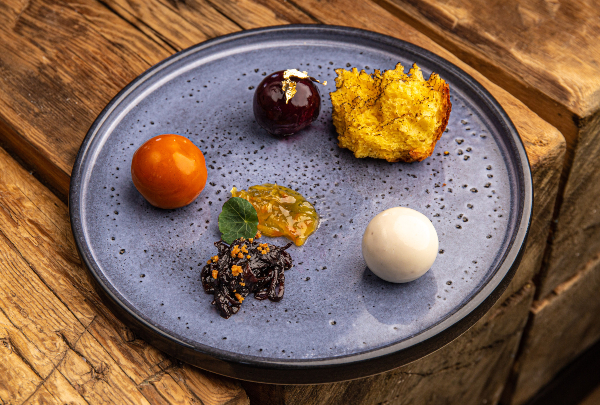
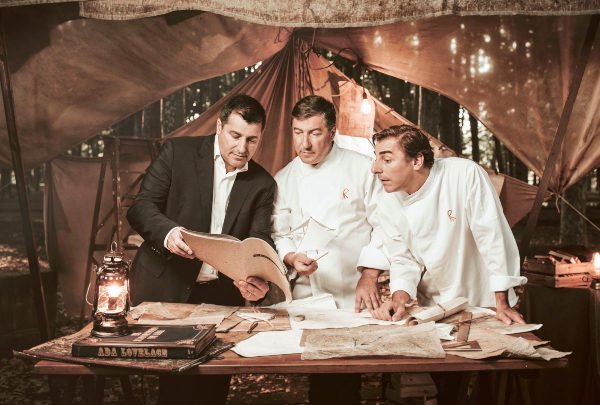
 600x405.jpg)

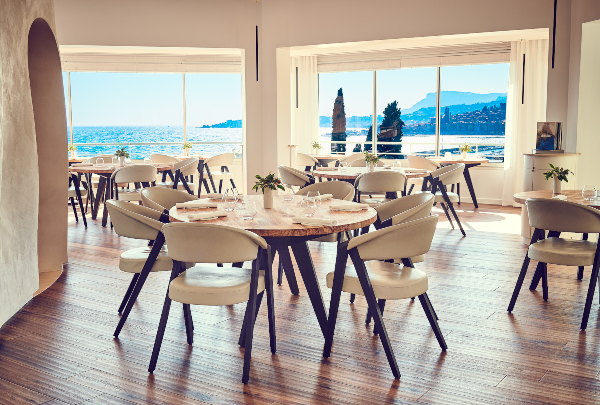
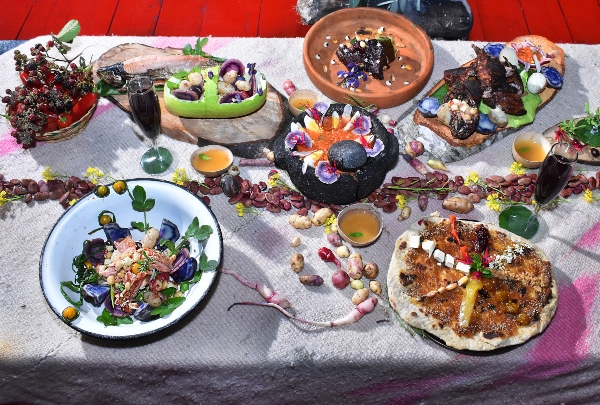
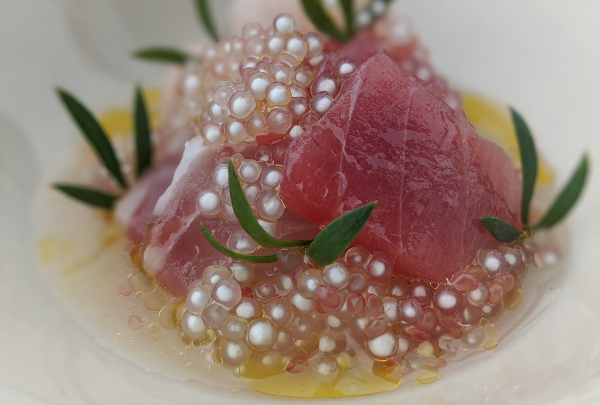
600x405.jpg)
.jpg)
